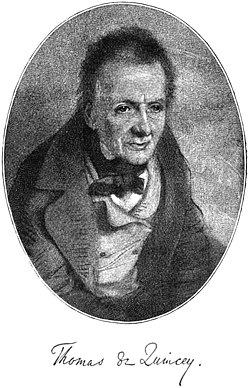Thomas De Quincey
Appearance

Thomas Penson De Quincey (August 15, 1785 – December 8, 1859) was an English essayist and intellectual.
Quotes
[edit]- Dyspepsy is the ruin of most things: empires, expeditions, and everything else.
- Letter to Hessey (1823).
- For if once a man indulges himself in murder, very soon he comes to think little of robbing; and from robbing he comes next to drinking and Sabbath-breaking, and from that to incivility and procrastination. Once begin [sic] upon this downward path, you never know where you are to stop. Many a man has dated his ruin from some murder or other that perhaps he thought little of at the time.
- "A Second Paper on Murder Considered as One of the Fine Arts" (1839).[1]
Confessions of an English Opium-Eater (1822-1856)
[edit]- The burden of the incommunicable.
- Pt. I.
- Call for the grandest of all earthly spectacles, what is that? It is the sun going to his rest. Call for the grandest of all human sentiments, what is that? It is that man should forget his anger before he lies down to sleep.
- Pt. I.
- So, then, Oxford Street, stonyhearted stepmother, thou that listenest to the sighs of orphans, and drinkest the tears of children, at length I was dismissed from thee.
- Pt. I.
- Cows are amongst the gentlest of breathing creatures; none show more passionate tenderness to their young when deprived of them; and, in short, I am not ashamed to profess a deep love for these quiet creatures.
- Pt. I.
- Flowers … that are so pathetic in their beauty, frail as the clouds, and in their colouring as gorgeous as the heavens, had through thousands of years been the heritage of children—honoured as the jewellery of God only by them—when suddenly the voice of Christianity, counter-signing the voice of infancy, raised them to a grandeur transcending the Hebrew throne, although founded by God himself, and pronounced Solomon in all his glory not to be arrayed like one of these.
- Pt. I.
- Thou hast the keys of Paradise, oh just, subtle, and mighty opium!
- Pt. II.
- It was a Sunday afternoon, wet and cheerless; and a duller spectacle this earth of ours has not to show than a rainy Sunday in London.
- Pt. II, Recalling the day in 1804 when he first took opium.
- Everlasting farewells! and again, and yet again reverberated—everlasting farewells!
- Pt. III.
- Tea, though ridiculed by those who are naturally coarse in their nervous sensibilities … will always be the favourite beverage of the intellectual.
- In many walks of life, a conscience is a more expensive encumbrance than a wife or a carriage.
- A promise is binding in the inverse ratio of the numbers to whom it is made.
- Appendix.
Quotes about De Quincey
[edit]- At one time five of us tried to understand De Quincey's marvelous "Dreams" more sympathetically, by drugging ourselves with opium. We solemnly consumed small white powders at intervals during an entire long holiday, but no mental reorientation took place, and the suspense and excitement did not even permit us to grow sleepy. About four o'clock on the weird afternoon, the young teacher whom we had been obliged to take into our confidence, grew alarmed over the whole performance, took away our De Quincey and all the remaining powders, administered an emetic to each of the five aspirants for sympathetic under- standing of all human experience, and sent us to our separate rooms with a stern command to appear at family worship after supper "whether we were able to or not."
- Jane Addams, anthologized in Sisters of the Extreme: Women Writing on the Drug Experience
References
[edit]- ↑ Thomas de Quincy. On Murder (Oxford: Oxford UP, 2006), 84


